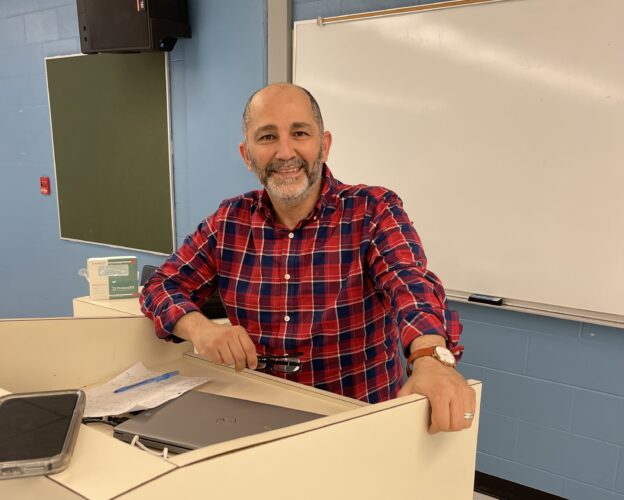Raleigh Hightower
Lifestyle Editor
rhightower@murraystate.edu
Aiming to educate students across all disciplines on the historical and current realities of American immigration, a professor in the Department of Political Science and Sociology hosted a presentation.
Associate Professor Ihsan Alkhatib hosted a discussion titled “Immigration Law: Overview and Current Issues,” on Thursday, Feb. 17 in Faculty Hall, room 208.
Alkhatib, who emigrated to the United States from Lebanon, practiced family, immigration and business law in the Detroit, Michigan, area for 10 years before joining Murray State’s political science department.
Through his experience in immigration law and his own immigration history, Alkhatib has watched American immigration law change dramatically throughout his career.
“[Immigration] has become easier due to technology and e-government,” Alkhatib said. “You can file applications online and check the status of cases online. It was harder for some time after 9/11 with the hardened attitude as to immigration.”
Alkhatib’s presentation began with an excerpt from “Walking to America with the Migrant Caravan,” an episode from the documentary series “Vice News Tonight.” The episode is about a caravan of migrants walking through Mexico to come to the United States. The episode clip shown in the presentation followed the journey of 16-year-old Mario Cartagena Martizen, a boy from Honduras.
The documentary started in the city of Arriaga in the Mexican state of Chiapas, which is located 2,260 miles south of the American border. Alkhatib explained in his presentation what types of factors might motivate migrants to go to such extremes to start new lives.
“Desperate people do desperate things,” Alkhatib said. “There are root causes in sending countries, push factors. Push factors are things such as poverty, war, unemployment and crime.”
Alkhatib also explained how ingrained immigration is in American history and how immigration has changed over time. Alkhatib said immigration has always been a part of American history.
Some notable historical immigration developments Alkhatib discussed in his presentation include: the Declaration of Independence, The Naturalization Act of 1790, The Immigration Act of 1924 and the Immigration and Nationality Act of 1965.
The Immigration and Nationality Act of 1965, signed into law by President Lyndon B. Johnson created the modern system of American immigration. This system established limits of immigrants allowed on a per-country basis.
After giving guests an introduction to the history of American immigration, Alkhatib discussed the current problems in immigration facing both America and the European Union.
One problem mentioned in the presentation was the extreme backlog of immigration courts. The nation’s most active immigration courts by caseload are Texas, California, Florida and New York. There are only 465 immigration judges while over 1.5 million cases are backlogged.
Another problem mentioned is the failure of politicians to pass any sort of immigration policy. Several past presidential administrations have made immigration a campaign talking point, but there has not little substantive change in policy.
Alkhatib also described legal challenges immigrants face under the current system.
“Those coming legally to this country are put through a very rigorous and exhausting process while others just cross the border,” Alkhatib said. “I am helping with an immigration case pro bono. My clients are immigrating legally, and it has been a long and exhausting process.”
Despite the various immigration problems in the country’s political and legal systems, Alkhatib said immigration is one of America’s strong suits. He mentioned the following quote by former president Ronald Reagan to illustrate this:
“You can go live in France, but you cannot become a Frenchman. You can go to live in Germany or Turkey or Japan, but you cannot become a German, a Turk, or a Japanese. But anyone, from any corner of the Earth, can come to live in America and become an American.”
To stay in touch with the Department of Political Science and Sociology, follow them on Facebook, @MurrayStatePSS, or on Instagram, @murraystatepss.


























































































